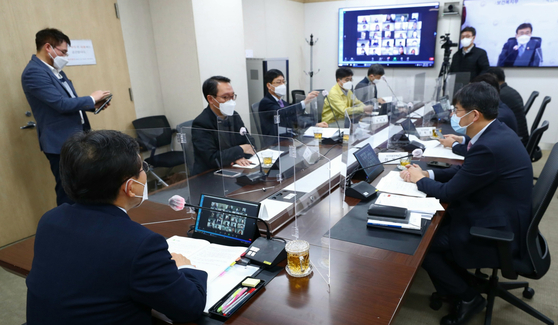
Minister of Health and Welfare Kwon Deok-cheol answers reporters’ questions at a non-face-to-face New Year press conference on the 21st. Ministry of Health and Welfare
New Minister of Health and Welfare Kwon Deok-cheol said, “I expect that 70% of the people will form collective immunity around November.” He also predicted that it would be difficult to escape from the novel coronavirus infection (Corona 19) even if you get a vaccine like the flu. He also mentioned that it is not possible to give vaccine options because it can confuse the public. Minister Kwon said at a non-face-to-face New Year’s press conference held through a video conference on the morning of the 21st.
At this meeting, Minister Kwon said, “For vaccine treatments, vaccines developed overseas will start in Korea in February, and domestically produced treatments will be conditionally commercialized in early February.” %, and (domestic) experts say 50%, but we see it as 70%. The first round (complete vaccination) is in September, and accordingly, around November, 70% of the people are expected to form collective immunity.”
Collective immunity is the concept that when the majority of the population has immunity, the ability to spread infectious diseases decreases, and even people without immunity are protected. Experts at home and abroad have predicted 60-70% of the population as a standard for population immunity from the beginning of Corona 19, and the World Health Organization (WHO) also proposed this line.
Anthony Pouch, the head of the National Institute of Allergies and Infectious Diseases of the United States, mentioned by Secretary Kwon, recently raised the target for collective immunity to 90%. What was in the early 70% range was raised to 90%, comparable to measles. This is because the spread of the corona 19 virus has become stronger with the advent of the mutant virus. Our quarantine authorities still maintain this standard.
Minister Kwon said, “Although there is a vaccine for influenza (flu), we cannot get out of it,” he said. “Many scholars say that Corona 19 will be the same.” “The reason we get the vaccine is to keep mild patients from becoming severely ill. So, before entering this winter, Korea is also aiming to minimize infection and reduce severe patients.” He referred to several types of Corona 19 vaccines scheduled to be vaccinated in Korea, and said, “There are various platform vaccines, so giving choices can confuse the public. We will closely monitor side effects during the vaccination process and manage cases promptly when specific vaccine cases emerge. The KCDC judges that it is difficult to give a choice.”
He said, “The communication problem is a very important task,” recalling last year’s flu vaccine crisis. Minister Kwon said, “A pan-government promotion team has been established at the Korean Disease Administration, but one branch will communicate accurately with the public and the media and correct any errors.” Because there was a problem to avoid, I will pay more attention to that part regarding this Corona 19.”
Minister Kwon said, “Even if we have 70% immunity (completed), there may be people who are infected,” he said. “In consideration of that, social distancing and quarantine rules should still exist.” “This year will be a parallel year for vaccines and treatments. Until the formation of collective immunity, they are contemplating what to do. Social distancing would be the most important, but even though the people voluntarily participated, it may be difficult to participate if fatigue increases and becomes dull. I think we should go to precise quarantine by subdividing uniform things into activities or actions.”
Minister Kwon served as the longest-soo vice minister of the Ministry of Health and Welfare. He was a former Ministry of Health and Welfare official who spent 32 years in the field of health care and social welfare until his retirement in 2019. During the 2015 Middle East Respiratory Syndrome (MERS) incident, he served as the general manager.
Reporter Esther [email protected]
